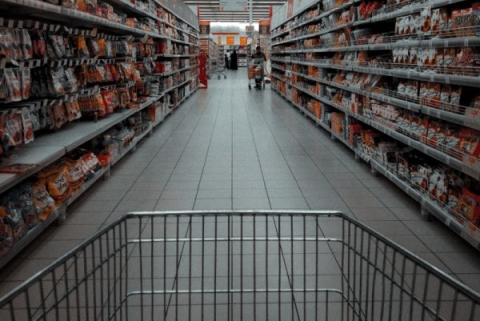

The study found that people changed where and how they shop, and increased their consumption of unhealthy snacks and alcohol during the first COVID-19 lockdown
6 July 2021
5 min read
The British public’s consumption habits have changed throughout the COVID-19 pandemic according to new research from the University of Portsmouth.
A study conducted by Senior Lecturer in Marketing at the Portsmouth Business School, Dr Sianne Gordon-Wilson has found that people changed where and how they shop, and increased their consumption of unhealthy snacks and alcohol during the first COVID-19 lockdown. These changes were found to be heavily linked to self-control and driven by fear, anxiety and stress caused by the pandemic.
The research took place throughout the UK’s first lockdown in April 2020, during which time fear of COVID-19 was high, as understanding of the virus was widely limited and the general population did not have any similar experiences for comparison. This coupled with the UK reporting the highest death rates in Europe led to many changes in consumer behaviour, and made the UK an interesting point of study.
Using a two stage research approach, Dr Gordon-Wilson observed the activity of two Facebook groups over a seven week period. She then used her findings to form a series of interview questions, to learn more about participants and their consumption patterns during the COVID-19 pandemic.
Consumption during a pandemic is largely unstudied due to the rare nature of these crises, particularly on a global scale like COVID-19.
Dr Sianne Gordon-Wilson, Senior Lecturer in Marketing at Portsmouth Business School
Driven by fear of contracting the virus, some participants changed where they shopped, moving from large supermarkets to smaller, less populated convenience stores that stocked essential items, and others began to use online shopping. One participant explained that she did not feel safe in long queues or browsing supermarkets with other customers, who seemingly did not adhere to social distancing guidelines.
Previously choosing their supermarkets based on price, range and quality, participants found changing the way in which they shopped, including store format, type and frequency helped them gain a sense of control in an uncontrollable time.
Dr Gordon-Wilson also found a change in snack consumption, in general participants described their self-control as diminishing, resulting in an increase in the consumption of unhealthy snacks.
Lowered self-control combined with lack of availability of healthy snacks at supermarkets as a result of panic buying, fewer supplies at home due to reduced shopping trips, and lack of structure resulted in participants finding themselves consuming more unhealthy snacks, as opposed to the healthier options they would consume prior to the pandemic.
One participant, who previously would snack on fruit and nuts, found that away from the structure and judgement of the office environment, his inhibitions were lowered and it became easier to consume unhealthy snacks with little thought.
Increases in unhealthy snacking and alcohol consumption are a form of coping mechanism to relieve negative emotions associated with the crisis
Dr Sianne Gordon-Wilson, Senior Lecturer in Marketing at Portsmouth Business School
The final key theme Dr Gordon-Wilson found was alcohol consumption, the study revealed that overall purchase frequency, quantity, variety and spend increased during the lockdown period.
As most people were strictly confined to their own homes, the boundaries between home, work and social life blurred, and general lack of structure eroded the difference between the weekdays and weekends. As a direct result participants felt less need to control the days in which they consumed alcohol.
Multiple participants named drinking as something fun and relaxing to do that passed the time and relieved boredom. Self-control dwindled as they sought the immediate rewards of pleasure, relaxation and distraction, over the long term benefits associated with abstaining from alcohol. Drinking gave participants more feelings of pleasure and joy, and alleviated negative feelings of fear and anxiety associated with the pandemic.
Dr Gordon-Wilson says “Crisis consumption has been researched extensively, however consumption during a pandemic is largely unstudied due to the rare nature of these crises, particularly on a global scale like COVID-19.
“Previous studies have found increases in unhealthy snacking and alcohol consumption are a form of coping mechanism to relieve negative emotions associated with the crisis, in this case fear of catching the virus, isolation, boredom and stress.
“However, existing research explores self-control as an internal process categorising individuals as having either high or low self-control. Whereas this study revealed individuals with high self-control changed their consumption habits during the pandemic, as they adapted to the environment and external influences. In these circumstances consumers can not be described as having low self-control as they were aware of their behaviours and did not consume to excessive or abusive levels.”
This study revealed individuals with high self-control changed their consumption habits during the pandemic, as they adapted to the environment and external influences.
Dr Sianne Gordon-Wilson, Senior Lecturer in Marketing at Portsmouth Business School
The results of Dr Gordon-Wilson’s research can be used by retailers, snack and alcohol manufacturers, and weight management businesses to gain, and retain customers through future pandemic and lockdown scenarios.
Online retailers can help to build trust with their customers by offering loyalty perks in the form of free delivery outside of peak hours and next day delivery options. Whereas local and small convenience stores could offer delivery services to people afraid or unable to leave their homes, or offer bookable shopping appointments outside of their busier times to minimise the amount of customers in store.
Snack and alcohol manufacturers could launch healthier alternatives during subsequent lockdowns to encourage healthier habits. They may even look to partner with organisations such as the NHS and weight management businesses, to encourage healthier consumption through social media and offer online support during lockdowns to support individuals with resisting temptation.
